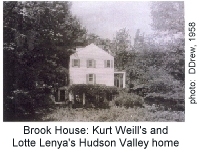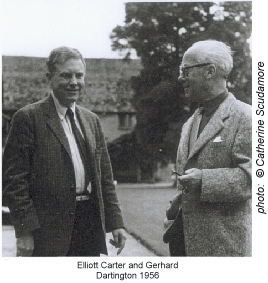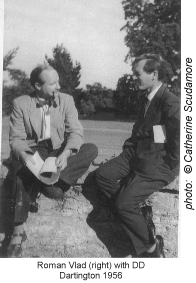| 1956 |
Spring/summer:
Informal assistant to William Glock as editor of a Gerhard issue
of The Score, for publication in September. D contributes a general essay,
The Musical Character, and the first-ever catalogue of Gerhard's
compositions (almost all of which still unpublished). At the Summer School of
Music in Dartington, Gerhard is a guest lecturer. Elliott Carter and
Roger Sessions are present at the premiere of Gerhard's String Quartet
No.1.
Also present is Roman
Vlad, who directs a film-music class together with D (who has recently
corresponded with Milhaud about Satie's score for Entr'acte).
Meetings with Richard Rodney Bennett, Cornelius Cardew, Peter
Maxwell Davies, Thea Musgrave, Malcolm Williamson, Hugh
Wood.
September: Three weeks
in Venice: attends the series of baroque and classical concerts associated with
the Vacanze Musicali at the Benedetto Marcello Conservatory, and the 19th
Festival of Contemporary Music at the Biennale, which culminates in the world
premiere of Stravinsky's Canticum Sacrum in St Mark's. An extensive
review of the festival is published in The Scotsman, and a shorter
review of I Vacanze Musicali in The Musical Times. Excursions with
Nono and Nuria Schoenberg. 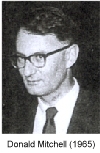
During the return journey by
train from Venice, D considers the events of the summer - the first since 1952
without a visit to Darmstadt - and decides to attempt a full-length study of
Weill.
Miles Tomalin no
longer has space for lodgers, but finds a room for D two floors above, with the
actor manager Ronald Adam and his wife. After some months chez Adams,
accepts the offer of lodgings with Kathleen and Donald Mitchell,
first in Notting Hill Gate, later in Pimlico.
ca. October:
Howard Hartog asks D to contribute a chapter on 20th-century French
music to a symposium he is editing for Routledge.
|
| 1957 |
The 60-page essay
Modern French Music is published in Hartog's symposium, 20th
Century Music (Routledge). It is generously reviewed - over-generously, in
the author's opinion (the subsequent paperback edition is only a slight
improvement). Typically the work of someone moving house, it coincided with a
radical pruning of the author's library of minor French (and other) music. Even
the Satie collection begun twenty years earlier is set aside for future
reconsideration - though that was not to come about for another three decades
(but see 1973).
From the Mitchells' Pimlico
home D writes to Lotte Lenya, outlining plans for WEILL: LIFE AND
WORKS, and seeking her approval as executrix of Weill's Estate. Her husband
George Davis replies favourably, and proposes a meeting in Berlin.
Routledge are actively interested in publishing the book.
August: At the Summer
School of Music in Dartington, the guest of honour is Stravinsky,
accompanied by his wife and Robert Craft. Gerhard is a guest lecturer.
Stravinsky asks to hear the recording of the premiere of Gerhard's First
Symphony under Hans Rosbaud, and listens to it attentively.
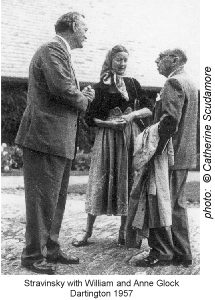
September: In Berlin.
Through Boris Blacher, in his capacity as Vice-President (future
President) of the West Berlin Academy of Arts, D is commissioned by the Academy
to prepare a catalogue of the holograph manuscripts in Weill's American home.
The commission is supported by most of Blacher's colleagues including his
former pupil Gottfried von Einem, but fiercely opposed in the name of
High German Art by Philipp Jarnach, a member of the Academy and in the early
1920s, one of Weill's influential teachers and friends. The catalogue is to
appear in the same series as Josef Rufer's just-published catalogue of the
Schoenberg manuscripts in Los Angeles (likewise commissioned by the
Academy).
At the Berlin Festival, D
meets Lotte Lenya and her husband George Davis, and attends the
post-war premiere of Weill's 3-act opera Die Bürgschaft, in a
revised version attributed to the librettist Caspar Neher and the director Carl
Ebert. Unknown to D at the time, because unattributed, the musical work on the
adaptation has been undertaken by von Einem and Francis Burt. Is introduced by
George Davis to the American musician, writer, and journalist Paul Moor.
27 November: George
Davis dies in Berlin at the age of 51.
|
| 1958 |
January: In Berlin,
meets Margarethe Kaiser, the widow of the playwright George Kaiser, now
sharing with Lenya an apartment on the Olivaerplatz. Renews acquaintance with
Paul Moor. Later in Zürich, meets Caspar Neher and discusses
a revision with Lenya a revision of Die Bürgschaft on which they
are to collaborate. It will discard all the textual and musical revisions made
in 1957, and restore what little had survived from Weill's own revisions. Neher
is wholly in favour, and later writes to Lenya to confirm his
agreement.
5 March: Visit to
Dorking with Oliver Neighbour to hear Vaughan Williams conduct the St
Matthew Passion with the local Bach Choir - as he has done every Easter
since he founded the choir in 1946.
2 April: Again with
Neighbour, D attends the world premiere in London of Vaughan Williams's Ninth
Symphony, conducted by Sir Adrian Boult. The symphony - which is not as well
received as it deserves to be - will be given again during the summer Prom
season at the Royal Albert Hall. But that will be the last performance in the
composer's lifetime: he dies at his London home on 26 August, a few hours
before his planned attendance at the first session for Boult's now historic
recording of the Ninth.
Summer/autumn: First
visit to USA; with the indispensable help of Margarethe Kaiser (who
meticulously deciphers old German script), DD begins work on the Weill papers
and manuscripts in Brook House, Weill's home in Rockland County, N.Y. In New
York. First of many discussions with Marc Blitzstein. Meetings with many
former associates of Weill and with prospective translators, including W.H.
Auden and Chester Kallman.
30 October: Together
with Lenya, signs Agreement with Little, Brown and Company of Boston for
the American rights in a so-called "official" biography of Weill ('not less
than 125,000 words') and in Lenya's autobiography ('not less than 70,000
words'). J.Randall Williams, a senior executive at Little, Brown, will
be an active and understanding supporter of the projects until his retirement
some ten years later. In due course Faber & Faber - represented
concurrently by Peter du Sautoy, Donald Mitchell, and Patrick
Carnegy - will assume responsibility for the publication in the UK and
Commonwealth of Drew's now voluminous Life & Works.
Begins WEILL: LIFE AND
WORKS by writing essays on each of the Broadway musicals. All will be
discarded in the early 1960s as fundamentally misguided, and replaced, one by
one.
Publications:
Topicality and the Universal: the strange case of Weill's 'Die
Bürgschaft' (Music and Letters); Brecht versus Opera
(The Score); DECCA BOOK OF BALLET (ed. with Robert
Boas and Quita Chavez).
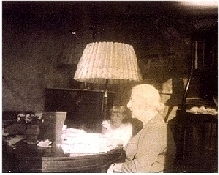
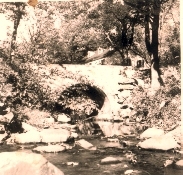
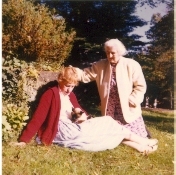
Margarethe
Kaiser and Lenya (beneath lamp), Berlin 1958
Brook House - the
bridge
Lenya and Margarethe Kaiser, Brook House, Summer 1958
Photos
© 2003 by David Drew
|
|
